So: your home planet has been destroyed. Or maybe not your home planet; maybe just the planet you were currently residing on. Either way, you find yourself suddenly without a planet (always an awkward position to be in), but at least with a spacecraft and an interstellar library of choice Earth works to tide you over on the long hyperspace journey to whatever world is nearest, which hopefully has not also been destroyed (though you never can tell). Thankfully, you were smart enough to load up your ship’s computer with the entire archive of Tor.com articles, and you can refer to this helpful list to choose the correct title to comfort you in the vast emptiness of space…
The Hitchhiker’s Guide To the Galaxy by Douglas Adams
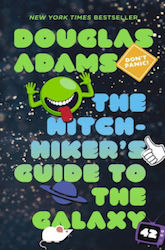 And no, this isn’t meant to refer to the guide within The Guide—otherwise known as “functionally Galactic Wikipedia”—but rather the novel itself; Adam’s seminal work regarding the sheer vastness (and strangeness) of a nearly infinite universe is the root from which all other witty space-faring adventures spring. The story of Earthman—and your fellow “lack of homeworld haver”—Arthur Dent being dragged across an uncaring cosmos to seek out the answer to Life, The Universe, and Everything should be a fantastic reminder that, even if your world has been destroyed, there are still adventures to have, and also that you shouldn’t panic, so long as you have your towel.
And no, this isn’t meant to refer to the guide within The Guide—otherwise known as “functionally Galactic Wikipedia”—but rather the novel itself; Adam’s seminal work regarding the sheer vastness (and strangeness) of a nearly infinite universe is the root from which all other witty space-faring adventures spring. The story of Earthman—and your fellow “lack of homeworld haver”—Arthur Dent being dragged across an uncaring cosmos to seek out the answer to Life, The Universe, and Everything should be a fantastic reminder that, even if your world has been destroyed, there are still adventures to have, and also that you shouldn’t panic, so long as you have your towel.
The Long Way to a Small, Angry Planet by Becky Chambers
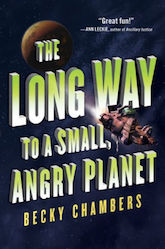 Speaking of the call to adventure—who needs your home planet! It was kind of worn around the edges anyway, right? And so what if your current craft is just as careworn: there’s no better reminder that the best adventures start from nothing than Chambers’s tale of Rosemary Harper and the family of neurotics, misanthropes, and degenerates (called so lovingly) that Harper meets on board the Wayfarer in its journey across the galaxy. Your world might be gone, but there should be plenty of others out there, and plenty of crews willing to take you on—and if you find one even half as good-natured as the cast of Chambers’s novel, you should be in good hands (or paws, or claws, or fins, or what have you).
Speaking of the call to adventure—who needs your home planet! It was kind of worn around the edges anyway, right? And so what if your current craft is just as careworn: there’s no better reminder that the best adventures start from nothing than Chambers’s tale of Rosemary Harper and the family of neurotics, misanthropes, and degenerates (called so lovingly) that Harper meets on board the Wayfarer in its journey across the galaxy. Your world might be gone, but there should be plenty of others out there, and plenty of crews willing to take you on—and if you find one even half as good-natured as the cast of Chambers’s novel, you should be in good hands (or paws, or claws, or fins, or what have you).
Everything Matters! by Ron Currie Jr.
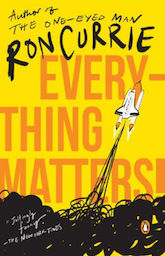 Perhaps it wasn’t just your homeworld that was destroyed, however—perhaps it was a cascading failure of physics or calamity, even now spreading across the galaxy, a statement by some hidden force or intergalactic deity that this universe is done, that humanity in general is done, and it’s only a matter of time before that cascading failure catches up with your small, lonely vessel, adrift in the cosmos. In that particular case, there’s no better volume to turn to than Ron Currie Jr.’s novel, a wellspring of compassion, humanism, and a reminder of the power acceptance can bring. The tale of Junior Thibodeau—born with the knowledge, implanted in his mind by some alien being, that humanity will meet its utter devastation thirty-six years hence—and his desperate, ultimately futile rage against the inevitable will be a helpful reminder that even if your universe does, for all intents and purposes, cease to exist, the kindness and decency of humanity will have left their own mark, one far greater than whatever harm we might have wrought.
Perhaps it wasn’t just your homeworld that was destroyed, however—perhaps it was a cascading failure of physics or calamity, even now spreading across the galaxy, a statement by some hidden force or intergalactic deity that this universe is done, that humanity in general is done, and it’s only a matter of time before that cascading failure catches up with your small, lonely vessel, adrift in the cosmos. In that particular case, there’s no better volume to turn to than Ron Currie Jr.’s novel, a wellspring of compassion, humanism, and a reminder of the power acceptance can bring. The tale of Junior Thibodeau—born with the knowledge, implanted in his mind by some alien being, that humanity will meet its utter devastation thirty-six years hence—and his desperate, ultimately futile rage against the inevitable will be a helpful reminder that even if your universe does, for all intents and purposes, cease to exist, the kindness and decency of humanity will have left their own mark, one far greater than whatever harm we might have wrought.
The Unnoticables by Robert Brockway
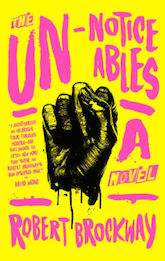 Or perhaps it wasn’t some sort of plague or intergalactic weaponry that destroyed your world—perhaps it was something unknowable, ancient, and full of hate: Lovecraftian horrors from beyond the cosmos that only seek to destroy or twist or eat. In that case, your best option might be to find inspiration in Brockway’s rollicking dual narrative of 1970s punks and a stuntwoman from the late 2000s facing off against unimaginable terrors that seek to destroy the world through sedition and absorption. Beer, anarchy, beer, a flagrant disregard for social norms, beer, an utter lack of anything resembling fear (or rational intelligence, really) and beer are what power Brockway’s characters; if you’re facing off with some similar unknowable horror, there are almost certainly lessons to be learned here.
Or perhaps it wasn’t some sort of plague or intergalactic weaponry that destroyed your world—perhaps it was something unknowable, ancient, and full of hate: Lovecraftian horrors from beyond the cosmos that only seek to destroy or twist or eat. In that case, your best option might be to find inspiration in Brockway’s rollicking dual narrative of 1970s punks and a stuntwoman from the late 2000s facing off against unimaginable terrors that seek to destroy the world through sedition and absorption. Beer, anarchy, beer, a flagrant disregard for social norms, beer, an utter lack of anything resembling fear (or rational intelligence, really) and beer are what power Brockway’s characters; if you’re facing off with some similar unknowable horror, there are almost certainly lessons to be learned here.
The World Without Us by Alan Weisman
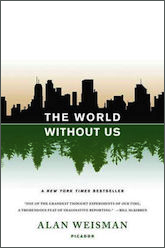 All right, worst case scenario: your spacecraft hasn’t managed to escape your devastated world, though it has insulated you from whatever plague/disaster wiped humanity off of its surface (if that isn’t the case, then you’re not likely reading this, and there’s not much Tor.com can do to help you). In that case, you’ll have no better reference to than Weisman’s non-fiction chronicle, a moment-to-moment guide to exactly how a world would fall apart after humanity’s disappearance. From what happens to our pets (feel bad for your dog; feel… less bad for your cat) in the immediate aftermath to a eons-later examination of what might still remain to mark humanity’s existence, Weisman’s work is a fantastic guide for what will await you in some sort of Richard Matheson, I Am Legend situation.
All right, worst case scenario: your spacecraft hasn’t managed to escape your devastated world, though it has insulated you from whatever plague/disaster wiped humanity off of its surface (if that isn’t the case, then you’re not likely reading this, and there’s not much Tor.com can do to help you). In that case, you’ll have no better reference to than Weisman’s non-fiction chronicle, a moment-to-moment guide to exactly how a world would fall apart after humanity’s disappearance. From what happens to our pets (feel bad for your dog; feel… less bad for your cat) in the immediate aftermath to a eons-later examination of what might still remain to mark humanity’s existence, Weisman’s work is a fantastic guide for what will await you in some sort of Richard Matheson, I Am Legend situation.
Hopefully, whatever it is that awaits you beyond the destruction currently preying on your psyche, one of these five books will help guide you through the aftermath. Regardless of whether you’re setting down to view the sunset on a world suddenly bereft of humanity, or heading into the unknown of the cosmos to find further adventure beyond the bounds of your (former) home, Tor.com wishes you the best in your continuing existence even in the face of unimaginable tragedy!
 DREW WILLIAMS has been a bookseller in Birmingham, Alabama, since he was sixteen years old, when he got the job because he came in looking for work on a day when someone else had just quit. Outside of arguing with his coworkers about whether Moby-Dick is brilliant (nope) or terrible (that one), his favorite part of the job is discovering new authors and sharing them with his customers. His novel The Stars Now Unclaimed is now available from Tor Books.
DREW WILLIAMS has been a bookseller in Birmingham, Alabama, since he was sixteen years old, when he got the job because he came in looking for work on a day when someone else had just quit. Outside of arguing with his coworkers about whether Moby-Dick is brilliant (nope) or terrible (that one), his favorite part of the job is discovering new authors and sharing them with his customers. His novel The Stars Now Unclaimed is now available from Tor Books.










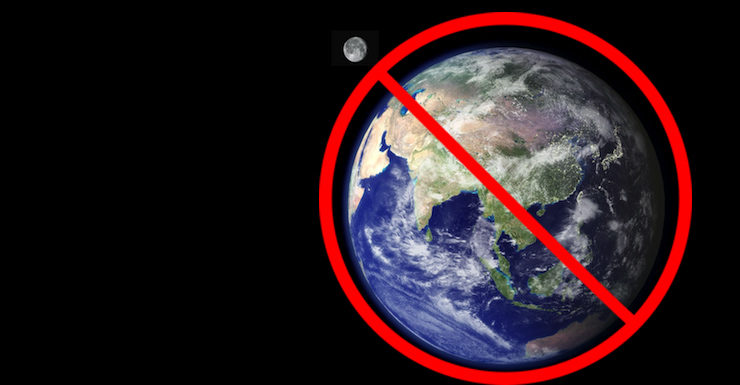
I’d add Sevenseves to the list, although I thought the time jump was a bit abrupt. And for a classic, how about When Worlds Collide and After Worlds Collide.
“The Songs of Distant Earth” of course.
A few Asimov books come to mind, from Robots and Earth forward in a series-spanning chronological tangle.. :)
@1 fcoulter, I was really enjoying Seveneves, but I gave up on it shortly after the time jump. It was too much of a disconnect for me, and the characters I had come to know were all gone. The book sat on my bedside table for over a year, with a marker about 2/3rds of the way through. I recently moved it from my table back to the bookshelf where it will likely remain.
You can always read eerie poetry as your dying planet drifts through space…
Voices are crying an unknown name in the sky
And “Stars In My Pocket Like Grains of Sand” by Samuel R. Delany! I’ve still never read another book that so effectively conveys just how big even just one PLANET is – let alone a star system, or a galaxy.He makes you really feel the vastness and alienation of displacement. Wild, brilliant novel.
Can’t go past “The Forge of God” and it’s sequel “Anvil of Stars” by Greg Bear – you destroy our planet, we destroy yours – a bit dark perhaps and bound to leave you feeling a bit paranoid when you look up at the stars and wonder what’s out there.
“The Forge of God” and it’s sequel “Anvil of Stars” by Greg Bear – seconded.
I would add that they are not much darker than most of the others, except may be the Hitchhiker.
On a related note, you could break all space-faring scifi down into two sets: universes where they still know where Earth is, and universes in which Earth has been ‘lost’.
I’ve always thought that losing a whole planet (especially your home planet) is pretty careless.
9: The novel Jandrax starts off with a mishap in which an FTL drive that can cross the Milky Way in a second or so is jammed on for a long time. Not sure they ended up in the observable universe.
Chandler’s Ehrenhaft Drive would ever so often provide ships with a one-time, extremely long ranged, random jump across the galaxy, with the result there were a number of colonies with no idea where they were and no idea where the Earth was in relation to that.
Shaw’s Nightwalk had an FTL drive that passed through a universe where A > B was not reversible. Try returning from B and you’d end up at C. In the end, Earth went for a brute force solution in which they sent out billions of cheap robots and hoped one would find its way home after discovering an Earthlike world. Misjumps in that setting meant getting very lost.
After Doomsday from Poul Anderson in a traditional Astounding earthman (and woman) overcomes all and makes songs about it.:
‘Have done, have done; make an end of war
(New centuries sing in birth)
And an end of woe and of tyrant rule —
In the name of living Earth!’
Anderson, Poul. After Doomsday